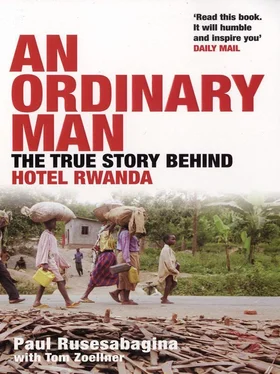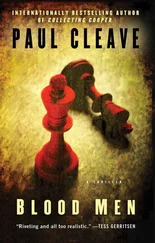I know that my promotion was resented among some of the people I had worked with at the front desk. Some of them started to call me a certain name behind my back: muzungu, the Kinyarwandan word for “white man.” We used to yell it out gleefully to European aid workers and missionaries when we were kids. It was not insulting in that context. But applied to me it was meant to be insulting; the equivalent, I am told, of the American phrase “Uncle Tom.” I suppose this should have gotten under my skin, but it did not. For one thing, jealousies and backbiting are common to any place of work. Show me a place where more than ten people are employed, and I’ll show you a coiled spring where everybody’s favorite game is called who’s up, who’s down (I confess to having played it myself). For another thing, I never felt as though I was being untrue to myself. Just the opposite: I was learning a great deal about the way my country really worked and meeting people who had grown up in circumstances even poorer than mine. We had gotten where we were due to hard work and determination. Never once did I feel as though I was being untrue to the life my father had wanted for me since the first day he took me to school at Gitwe and told me that if I was willing to do the work I would be successful in the world.
I do not agree with those who say that you cannot be successful and authentic at the same time. If advancing in the world is viewed as a form of treason, then we are all in trouble.
So I tried not to let the mutterings of muzungu bother me, but a day came when I had to assert myself to my old friends at the front desk. The flashpoint was a phone call. Somebody had telephoned the Mille Collines and asked to speak with “the African general manager.” The call was clearly for me, but the receptionist, an old colleague of mine, insisted on taking the call himself. I think he wanted to show that he didn’t think much of me anymore. After that incident, I took him aside.
“Listen, my friend, ” I said. “Today, I am your boss and you must respect me.”
I made the same kind of point to my white coworkers, and again it was over something trivial. All the top department heads were supposed to meet weekly to discuss various issues, and these sessions required a secretary to take notes. I was always asked to do this. Eventually, I asked that the duty be rotated with each meeting, and my colleagues quickly agreed. A small point, but one that earned me respect in the long run.
Year followed year. I kept climbing. In 1992, I was made the general manager of the Hotel Diplomates, the other capital city luxury hotel owned by Sabena. It was a smaller property barely a half mile up the hill from the Mille Collines, but no less prestigious. The Diplomates catered mainly to ambassadors, presidents, prime ministers, and other dignitaries visiting Rwanda from other parts of Africa and the world. There were sixteen big luxury suites, forty regular rooms, a wide lawn, a resplendent terrace, and a very good restaurant called The Rotunda. I was no longer working in my beloved Mille Collines, but this was a huge step up the ladder. I had become the first black general manager in the company’s history.
It was a small distinction, I suppose, but I only wish my father could have seen it. He had died the year before, at the age of ninety-three in a hospital in the town of Kibuye, where he had gone for surgery. The light was still in his eyes the last time I saw him. He said a curious thing. “Listen, my son. You might meet hyenas on their way to hunt. Be careful.” It was very typical of him to talk in these kinds of parables, but I have wondered many times about what he meant. Perhaps he was just telling me to be careful that day on the drive back to Kigali. Perhaps it was meant to be a caution for the years to come. I’ll never know because my father died later that day. He was so important to me, a man who taught me most of what I know about patience, tolerance, and bravery. He had always wanted me to come back to my home to be the mayor, and I suppose on this count, I hadn’t quite lived up to his expectations. But I still knew that he had been terribly proud of the work I was doing in Kigali and that he loved me. I could not ask for too much more than that.
I regret immensely not being able to do something important for my parents before they left the world. They had given me their best when I was a child and, now that I was a grown man, I wanted to build them a new house on the hill or do something else to make sure they were comfortable. This is the Rwandan way. But shortly before my father died, my mother had gone in for a routine doctor’s visit and they found a cancer inside her. This strong and lively woman quickly grew frail and I was powerless to do anything about it. The last words she ever said to me were spoken from her hospital bed. “Son, I am going to my house now, ” she told me. I can only hope that, wherever she is today, her house is more splendid than anything I could have ever imagined for her.
As the general manager of the Diplomates I had to do a lot of negotiating. There were food contracts to be signed, employee grievances to be addressed, conference rooms to be booked, wedding receptions to accommodate. More often than not I conducted these talks inside the bar or in the restaurant. I had learned how friendship and business can be artfully juxtaposed without corrupting each other.
Let me explain. We have a saying in Rwanda, a leftover from the brief time when we were a colony of the Germans: “Dienst ist dienst, und schnapps ist schnapps.” It means “work is work and booze is booze.” There were often sticky issues to work through in my new job, but I had long ago discovered the value of a compartmentalized mind. You could never let your opinion of a person interfere with the business between you. He may be your best friend or somebody you detest, but the conversation should not change. Dienst ist dienst.
I met many people in Rwanda whose racial ideology I couldn’t stand, but I was unfailingly polite to them, and they learned to respect me even though our disagreements were obvious. This led to a priceless realization for me. Someone who deals can never be an absolute hard-liner. The very act of negotiation makes it difficult, if not impossible, to dehumanize the person across the table from you. Because in negotiation you will never get 100 percent of what you want. You are forced to make a compromise, and by doing this you are forced to understand, and even sympathize with, the other person’s position. And if cups of good African coffee, some wine, a cognac, or all of the above could help lubricate this understanding, it was all to the good.
So I spent as little time as possible shut up inside the walls of my office. I took my morning coffee at the bar, watched the comings and goings, made careful note of who the regulars were, followed the gossip about their careers, and saved up that knowledge for the frequent times when I would find myself clinking glasses of complimentary Merlot with a man whose friendship was another link to the power web of the capital and whose favor I could count on in the future. And the presence of beverages always kept the tone easy and social, even when the subtext of the discussion was quite serious.
It was just like my father had said: “You never invite a man without a beer.”
ON AUGUST 8, 1993, a new radio station went on the air. It called itself Radio-Télévision Libre des Mille Collines. I would come to wish that the name of this station wasn’t so similar to that of my beloved hotel.
The station broadcast at 106 on the FM dial and called itself by the call letters RTLM, in the American style. It billed itself as the very first private radio station in the country, and it was an immediate sensation. It started by playing Congolese music virtually nonstop. I am not a man who particularly likes to dance, but even I can tell you that this is a fun, bouncy, energetic type of music to which you cannot help but move your feet a little. RTLM then started to broadcast a few human voices, like a shy child finding its courage. The disk jockeys began to talk more. Then they started telling mildly dirty jokes. Then they started a call-in format in which ordinary Rwandans could hear their own voices broadcast over the air. People began calling in with road information, song dedications, complaints about local politicians, rumors, speculations, opinions, chatter. We have a saying here about the nature of neighborhood gossip. We call it radio trottoir-or, the “radio of the sidewalk.” RTLM was the radio of the sidewalk suddenly blasted out to the whole country.
Читать дальше











![Paul Finch - A Wanted Man [A PC Heckenburg Short Story]](/books/702381/paul-finch-a-wanted-man-a-pc-heckenburg-short-sto-thumb.webp)
